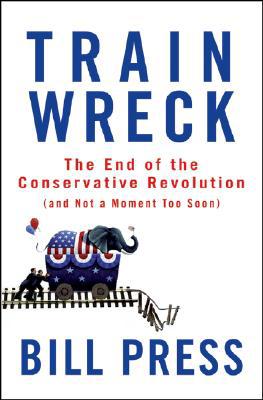

| TRAIN WRECK The End of the Conservative Revolution (and Not a Moment Too Soon) Bill Press New York: John Wiley & Sons, 2008 |
Rating: 5.0 High |
|||
| ISBN-13 978-0-470-18240-6 | ||||
| ISBN-10 0-470-18240-7 | 248p. | HC | $24.95 | |
Bill Press shows us here that the conservative movement we know today, though it stretches back in history five decades, is much changed from the original nature of conservatism.
"The Progressive Era lasted twenty years, from the election of Teddy Roosevelt to the end of World War I. The New Deal Era lasted thirty-six years, from the election of Franklin D. Roosevelt to that of Richard Nixon. And the Conservative Era lasted more than fifty years, from the rise of Robert Taft until the fall of George W. Bush." (emphasis in original.) – Page 1 |
The thrust of his work is that modern-day conservatism, heavily influenced by the Neoconservative clan, is inherently flawed to the extent that it must never again be allowed to control the U.S. government. Press argues that the Neoconservatives — Karl Rove and the rest — caused severe problems, chiefly in foreign policy; but they are not to blame for the ultimate failure of conservatism. That blame lies with modern conservatism's inherent antipathy to government. When you consider Grover Norquist's wish to drown government in the bathtub, or Reagan's pronouncement that "Government is not a solution to our problem; government is the problem," you realize that Press's argument is hard to dispute.
In the course of it he touches on many of the too-familiar of Bush administration goofs and greeds: Katrina, the botched occupation of Iraq, No Child Left Behind, Medicare Part D, mismanaging HSD, the Abramoff scandal, Cheney's secret energy task force. And he leaves out some I would have included, such as vetoing S-CHIP and outing Valerie Plame. But there are so many... One I was unaware of: milking the student loan program (pp. 61-64).
Press's well-organized book (his third) examines the major functions of U.S. government: defending the nation, protecting the environment, upholding the Constitution and federal laws, regulating the economy, managing international relations, fostering effective education. For each area, he contrasts the performance of modern conservatives with the standards they avow and the promises they make. Press looks back in history for insights and examples, to Taft and Truman, to the Civil War, to the era of the Founding Fathers.1 He shows us by these examples that conservatism once meant something very different from the modern form: that it counselled restraint in entering conflicts, thrift in spending public monies, and respect for the rule of law. Today, almost every principle of this paleoconservatism has been turned on its head, in practice if not in rhetoric. The result is that, in almost every case, modern conservatives come off looking inept or corrupt. The book summarizes the situation thus:
"But by attempting to lay all the blame on Bush and the neocons Bush surrounded himself with, Buchanan and others miss the point. True, President Bush—who first sold himself to the nation as a "compassionate conservative" from Texas, as opposed to those cold-hearted conservatives from Washington— did indeed inflict the country with the exact opposite of everything conservatives were supposed to stand for: out-of-control spending, record deficits, bloated executive power, erosion of individual liberties, a more powerful central government, and a bellicose foreign policy. But he was only able to do so with the help of other conservatives. For the first six years of the Bush administration, remember, conservatives were in charge—of everything! Dick Cheney and Karl Rove ruled the White House; Donald Rumsfeld and Condoleeza Rice, the Cabinet; Bill Frist and Trent Lott, the Senate; Tom DeLay and Denny Hastert, the House of Representatives; William Renquist, Antonin Scalia, and Clarence Thomas, the Supreme Court; Jack Abramoff, the K Street lobbyists; the Heritage Foundation, the Washington think tanks; and Fox News, the media. With George W. Bush in the catbird seat. They worked together. They governed as conservatives. They set forth a conservative agenda. They promoted conservative policies. If the Bush era wasn't an era of conservative unity, we'll never see one. They embodied conservativism, and they left behind a broken government. Together they proved that conservatism is not a viable governing philosophy." – Page 1 |
Press documents his case with abundant facts and figures. The book is a very well-researched analysis that should be read by every American. Fortunately, it is an easy read that can be taken chapter by chapter. A bibliography lists 29 titles; I am sure he mentions other throughout the text. There is an index. He cites sources inline, so needs no endnotes. Bill Press cohosted CNN's Crossfire for 6 years. He now hosts a talk show on the "Green960" network. I recommend that show for anyone interested in current affairs.2 And I recommend this book as a must-read and a keeper.

 To contact Chris Winter, send email to this address.
To contact Chris Winter, send email to this address.